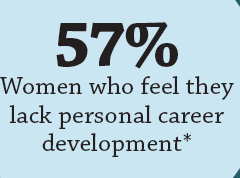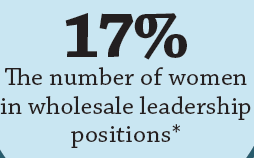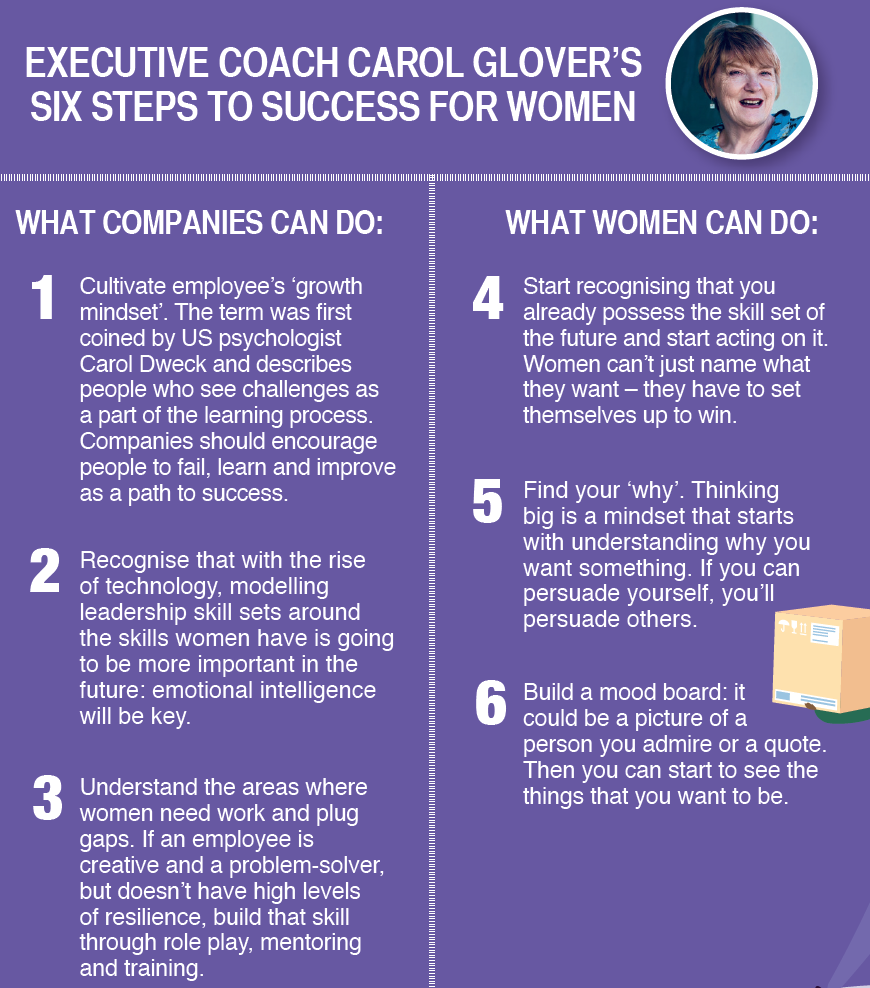Women possess the skill set to be the wholesale industry leaders of the future, but many still lack the confidence to put themselves forward. Helena Drakakis looks at the progress made in wholesale and the changes still needed.
In the future, robots and droids will carry out the routine, monotonous, command-and-control tasks in the workplace. What’s increasingly being sought after are “soft skills”, such as empathy, flexibility and problemsolving. This is the opinion of executive coach Carol Glover, only she refuses to use the words “soft skills” – she calls them “superpowers”. “
Women have these superpowers, but most of us are not using them. We’ve spent years thinking we have to play by the rules of the men’s game, but we need to help women step back and realise there’s a completely different way to get up the mountain, whether that’s in flipflops or stilettos,” she says.
Glover is not alone in her analysis. Recent studies carried out by leadership experts Jack Zenger and Joseph Folkman, published in the Harvard Business Review, suggest women score more highly than men when it comes to leadership attributes including integrity, relationship building, collaboration and being resultsdriven. Only in the two areas of technical or professional expertise and strategic thinking did men score higher.

The data, collected from 2016 onwards, also showed that confidence levels in women younger than 25 were low. “Our data on confidence shows there’s a need for organisations to give more encouragement to women. Leaders can assure them of their competence and encourage them to seek promotions earlier in their careers,” the researchers say.
The wholesale industry
Confidence is a key area women in the UK wholesale industry have identified as a barrier to progress. A recent study, carried out by research company HIM and the Women in Wholesale (WiW) initiative, four years after its launch, shows more than half (57%) of women in the industry feel they lack personal career development – a number that has increased by six percentage points since 2017.
That said, the number of women in leadership positions overall has risen in the industry – 11% in 2016 compared to 17% in 2019. “Our progress over the past four FEATURE years has been really encouraging, but we are still some way from the government-backed target of 33% women in senior leadership roles in FTSE 350 companies by 2020,” says WiW founder Elit Rowland. “We need to continue to build work structures and cultures that accommodate women and nurture them through the talent pipeline.”
Tackling the issue of confidence headon, WiW has initiated its own ‘Confidence Coaching Workshops’, where up to six women are invited to a session. Oneto- one sessions have also been initiated within five wholesalers.
Boosting confidence
“Building in a mentoring scheme as part of the company culture or offering inhouse confidence coaching is one way to encourage women to set goals and stick to them,” says Rowland. Emma Holden, group marketing manager at the Country Range Group (CRG), says having an outside coach, supported by hercompany, means she can tackle personal goals alongside the professional.
 “When you complete an internal personal development plan, the focus is often on what is happening inside the company. “Putting myself out there, making contacts and pushing for an opportunity to do more public speaking are things that will benefit CRG, but they are also about my progression. Having an outside coach meant the main driver of the conversation was where I see myself in five or 10 years’ time,” she says.
“When you complete an internal personal development plan, the focus is often on what is happening inside the company. “Putting myself out there, making contacts and pushing for an opportunity to do more public speaking are things that will benefit CRG, but they are also about my progression. Having an outside coach meant the main driver of the conversation was where I see myself in five or 10 years’ time,” she says.
Holden, who has been required to quickly step up in her role following a promotion, says talking through pressure points and being able to check in with someone unconnected to her day-to-day work means she doesn’t burden her boss with every problem.
Checking in with her coach also means she is more likely to action the goals on her list. “At work, I’ve got a million things to do each day and my progression always gets knocked off my priority list, whereas coaching has a structure and it means my development is not forgotten,” she adds.
Sharing stories
According to Glover, networking initiatives such as WiW also act as valuable spaces for women to share stories and practical advice. JJ Food Service human resources manager Joanna Florczak has taken this idea in house and now arranges women’s breakfast mornings.
“We surveyed the women at JJ and found that many didn’t have the confidence to put themselves forward for roles. We organised coaching sessions and we followed up with JJ Breakfast Club,” explains Florczak.
These one-hour socials take place before work and provide a relaxed atmosphere in which women can talk over coffee and croissants, share experiences and be inspired. They can also listen to guest speakers, the first of which was JJ’s chief operating officer, Mushtaque Ahmed, who spoke about the skills and attributes he looks for in managers of the future.
“It’s a chance for women to meet senior people in a friendly atmosphere. I climbed up the ladder to management in 13 years and I want women to know progression is possible. It’s important to speak up so you can inspire others,” says Florczak.
The company has held three breakfast mornings so far, and in January, it will host its first ‘Women in Fish & Chips’ event. This follows a survey of female chip shop owners, three quarters of whom said they would benefit from networking in the industry with other successful women.
The company also launched its ‘Women in the Warehouse’ campaign in 2017 to encourage more women to take on traditional male roles. Its target is for 20% of such roles to be taken by women and, currently, it has reached 19% in its Enfield branch and 7.5% across the business.
This year, it also reported that it received 50% of its applications for two branch manager vacancies from women. While women were not eventually given the roles, Ahmed says that this is a first for the company. “Despite not making the final cut, having 50% female applicants shows that we are on the right track to developing a good level of diversity in our pipeline,” he says.
Modelling behaviour
Despite such initiatives, Glover says change must go deeper and that companies must start modelling female behaviour, not only to push women forward, but as vital skill sets for overall economic success.
Indeed, Nir Jaimovich, affiliated professor at the University of Zurichbased UBS Center of Economics in Society, says the “key driver seems to be growing demand for social skills, such as empathy, communication, emotion recognition and verbal expression, in which evidence from psychological research indicates that women have a comparative advantage”.
However, the rise in highskilled women taking themselves out of permanent employment, either by starting their own businesses or working as freelancers, suggests that skills are still not being catered for in the mainstream.
Figures from the Association of Independent Professionals and the Self-Employed (IPSE) confirm women are leading the rise of the skilled freelance sector. Between 2008 and 2018, the number turning to self-employment increased by 63%.
Part of the reason for this may be a lack of flexible working opportunities, but Glover says it may also be because companies promote male attributes as the only markers of leadership.
“What companies need to do to help personal career development is to cultivate a growth mindset. It a mindset that says: ‘I want to do something and I don’t care if I fail 22 times, but I’m going to get there.’ Women must also embrace this, live big and not worry about who is saying what about them,” she says.
Promoting progressive work cultures
One of the most encouraging developments in wholesale, says Rowland, is the reduction in the number of women who consider the lack of flexible working to be a barrier to progress.
According to this year’s WiW study, 15% viewed this as a key issue compared to 53% in 2017. Rowland says “a key catalyst” in highlighting the benefits of offering flexible working has been a study from job-design agency Timewise, commissioned by the Federation of Wholesale Distributors. The study concluded that wholesale could boost productivity, increase motivation among staff and attract a greater diversity of talent by developing a flexible working policy, rather than offering it on an ad-hoc basis.
Foodservice wholesaler Bidfood took part in the project and has been looking at ways to develop flexible working across its business. HR and sustainability director Heather Angus says one element driving a change in policy was the high proportion of millennials in the business. By offering flexibility, be it working from home or altering hours to better suit a lifestyle, Bidfood has “identified an uplift in engagement” and views it as an “opportunity to attain and retain the best”.
“We definitely see flexible working as a motivator for our employees. It minimises the risk of burnout, reduces stress and allows employees to achieve a better balance of work and home responsibilities,” she says.
Over and above the company’s legal requirements concerning flexible working, it has put in place informal arrangements across the business. Added to that, it has begun analysing research exploring the needs of Generation Z, to better plan for the future. Finally, it is liaising with trade unions to determine how flexible working might look for warehouse and transport employees, whose roles are often more difficult to find solutions for.
Angus says: “It’s always a challenge when you make changes to policies. Our business support centre is a good example of roles suitable for flexible working as it houses many of our marketing teams, sales teams, category teams and buying teams.
“However, it’s always going to be more challenging when looking at ways to support flexible working with warehouse and transport employees. How do we resource plan to allow flexibility without driving cost into our business?”
*According to a study conducted by Women in Wholesale












